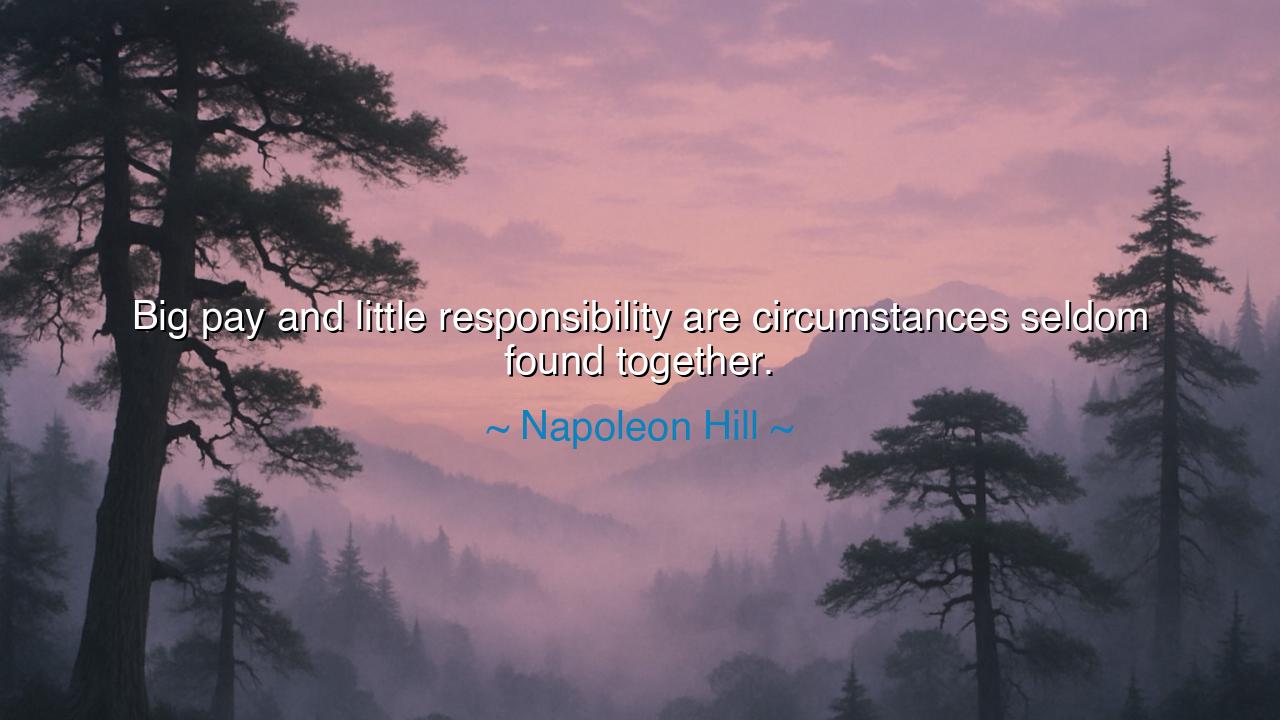
Big pay and little responsibility are circumstances seldom found






The words of Napoleon Hill carry the weight of practical wisdom, spoken not with softness but with the steel of truth: “Big pay and little responsibility are circumstances seldom found together.” At their heart, these words reveal a universal law of human endeavor: that reward is bound to duty, that wealth and honor flow toward those who accept burdens others will not bear. To seek great gain without great accountability is to dream of harvest without planting, of crowns without battles.
In the realm of life, responsibility is the price of pay. The farmer who tends only a single patch of earth reaps a small reward, while the one who labors over vast fields shoulders heavier toil, but gathers a greater harvest. So it is with every craft, every office, every station. The higher one rises, the greater the burden of care. The general receives glory, but he also bears the lives of his soldiers in his command. The king sits on the throne, but he carries the fate of the realm upon his shoulders. Thus Hill’s words are a reminder that greatness is never free—it is tethered to responsibility as shadow to flame.
History gives us a clear image in the figure of Abraham Lincoln. His pay, in the sense of honor and legacy, was immense; his name endures across centuries. Yet the responsibility he bore was crushing. He guided a nation torn by civil war, each decision heavy with the lives of thousands. Had he sought the honor of the presidency without the will to shoulder its burdens, he would have been destroyed. But he accepted the weight, and through it earned greatness. Truly, in him we see the truth of Hill’s saying: reward and responsibility are two halves of the same coin.
The ancients also understood this law. In Rome, the consul who commanded legions was honored above men, yet if his command faltered, the wrath of the people and Senate fell upon him with equal weight. Likewise, in Sparta, kings were revered, but they were judged more harshly than the lowest soldier should they fail in duty. These societies knew what Hill spoke plainly: big pay and little responsibility do not walk together. The one who seeks reward without burden is unfit for honor.
And yet, there are always those who chase the mirage of ease—who dream of riches without work, of authority without duty, of power without accountability. Such men may find temporary gain, but it fades swiftly, for without responsibility, wealth crumbles, trust dies, and respect dissolves into scorn. Hill’s words are a warning to all: do not chase the illusion of fortune without effort, for it will betray you. True and lasting reward comes only through the willingness to bear weight, to carry the burdens that others flee.
The lesson, O seeker, is clear: if you desire big pay, first prepare to embrace great responsibility. Do not shrink from challenge; instead, take it as the gateway to reward. If your burden is heavy, know that it is the very proof of your worth. And if your pay is small, do not curse fate—rather, ask what greater responsibility you might take on, for in that acceptance lies the key to growth.
Practical wisdom follows: in your work, seek out responsibility. Take ownership of tasks others avoid. Be the one who can be relied upon in crisis. Do not ask for reward before you have proven your worth in the fire of responsibility. Over time, your efforts will be recognized, and your reward will match your burden. But even before that day, you will know the noblest reward of all: the strength and dignity of one who carries weight with honor.
So let Napoleon Hill’s words endure as law: “Big pay and little responsibility are circumstances seldom found together.” For the path of greatness is not the path of ease. To rise is to carry, to earn is to endure, to lead is to serve. And in the marriage of responsibility and reward, the soul of true success is found.






AAdministratorAdministrator
Welcome, honored guests. Please leave a comment, we will respond soon